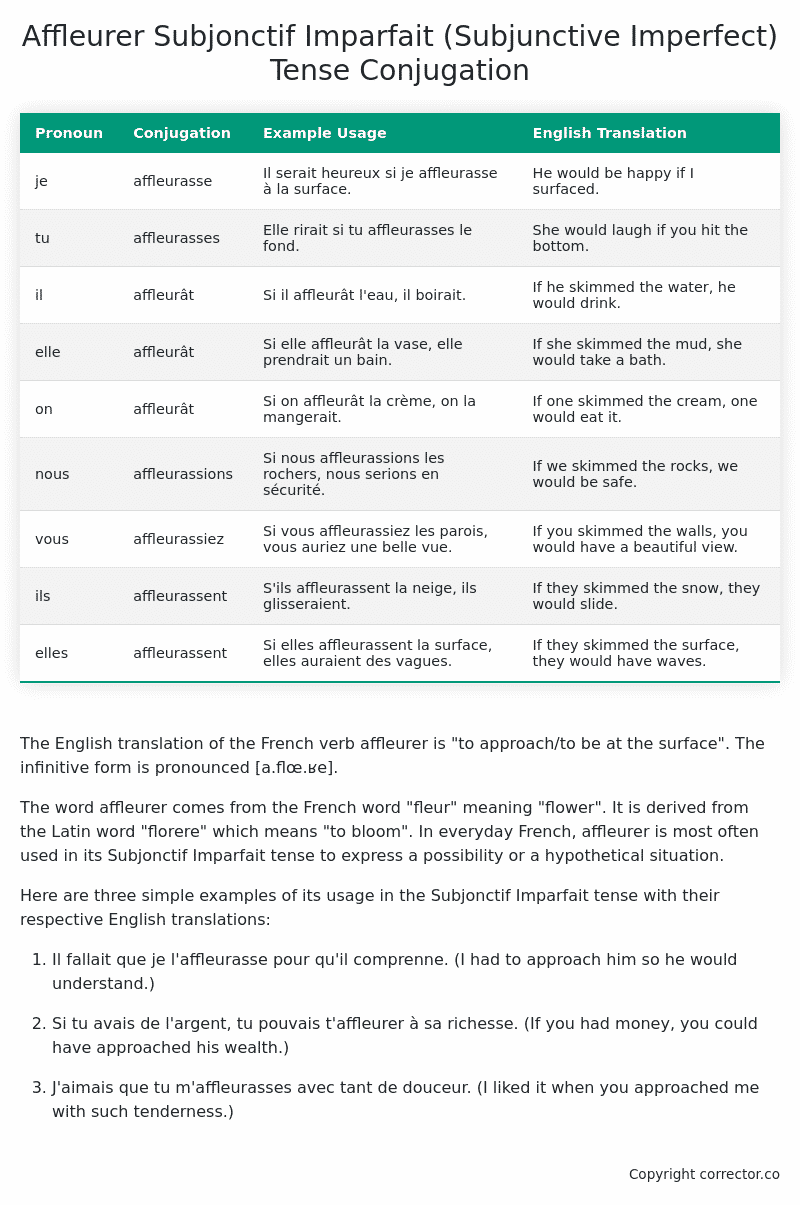Subjonctif Imparfait (Subjunctive Imperfect) Tense Conjugation of the French Verb affleurer
Introduction to the verb affleurer
The English translation of the French verb affleurer is “to approach/to be at the surface”. The infinitive form is pronounced [a.flœ.ʁe].
The word affleurer comes from the French word “fleur” meaning “flower”. It is derived from the Latin word “florere” which means “to bloom”. In everyday French, affleurer is most often used in its Subjonctif Imparfait tense to express a possibility or a hypothetical situation.
Here are three simple examples of its usage in the Subjonctif Imparfait tense with their respective English translations:
-
Il fallait que je l’affleurasse pour qu’il comprenne. (I had to approach him so he would understand.)
-
Si tu avais de l’argent, tu pouvais t’affleurer à sa richesse. (If you had money, you could have approached his wealth.)
-
J’aimais que tu m’affleurasses avec tant de douceur. (I liked it when you approached me with such tenderness.)
Table of the Subjonctif Imparfait (Subjunctive Imperfect) Tense Conjugation of affleurer
| Pronoun | Conjugation | Example Usage | English Translation |
|---|---|---|---|
| je | affleurasse | Il serait heureux si je affleurasse à la surface. | He would be happy if I surfaced. |
| tu | affleurasses | Elle rirait si tu affleurasses le fond. | She would laugh if you hit the bottom. |
| il | affleurât | Si il affleurât l’eau, il boirait. | If he skimmed the water, he would drink. |
| elle | affleurât | Si elle affleurât la vase, elle prendrait un bain. | If she skimmed the mud, she would take a bath. |
| on | affleurât | Si on affleurât la crème, on la mangerait. | If one skimmed the cream, one would eat it. |
| nous | affleurassions | Si nous affleurassions les rochers, nous serions en sécurité. | If we skimmed the rocks, we would be safe. |
| vous | affleurassiez | Si vous affleurassiez les parois, vous auriez une belle vue. | If you skimmed the walls, you would have a beautiful view. |
| ils | affleurassent | S’ils affleurassent la neige, ils glisseraient. | If they skimmed the snow, they would slide. |
| elles | affleurassent | Si elles affleurassent la surface, elles auraient des vagues. | If they skimmed the surface, they would have waves. |
Other Conjugations for Affleurer.
Le Present (Present Tense) Conjugation of the French Verb affleurer
Imparfait (Imperfect) Tense Conjugation of the French Verb affleurer
Passé Simple (Simple Past) Tense Conjugation of the French Verb affleurer
Passé Composé (Present Perfect) Tense Conjugation of the French Verb affleurer
Futur Simple (Simple Future) Tense Conjugation of the French Verb affleurer
Futur Proche (Near Future) Tense Conjugation of the French Verb affleurer
Plus-que-parfait (Pluperfect) Tense Conjugation of the French Verb affleurer
Passé Antérieur (Past Anterior) Tense Conjugation of the French Verb affleurer
Futur Antérieur (Future Anterior) Tense Conjugation of the French Verb affleurer
Subjonctif Présent (Subjunctive Present) Tense Conjugation of the French Verb affleurer
Subjonctif Passé (Subjunctive Past) Tense Conjugation of the French Verb affleurer
Subjonctif Imparfait (Subjunctive Imperfect) Tense Conjugation of the French Verb affleurer (this article)
Subjonctif Plus-que-parfait (Subjunctive Pluperfect) Tense Conjugation of the French Verb affleurer
Conditionnel Présent (Conditional Present) Tense Conjugation of the French Verb affleurer
Conditionnel Passé (Conditional Past) Tense Conjugation of the French Verb affleurer
L’impératif Présent (Imperative Present) Tense Conjugation of the French Verb affleurer
L’infinitif Présent (Infinitive Present) Tense Conjugation of the French Verb affleurer
Struggling with French verbs or the language in general? Why not use our free French Grammar Checker – no registration required!
Get a FREE Download Study Sheet of this Conjugation 🔥
Simply right click the image below, click “save image” and get your free reference for the affleurer Subjonctif Imparfait tense conjugation!

Affleurer – About the French Subjonctif Imparfait (Subjunctive Imperfect) Tense
Formation
Common Everyday Usage Patterns
Interactions with Other Tenses
Subjonctif Présent
Indicatif Passé Composé
Conditional
Conditional Perfect
Summary
I hope you enjoyed this article on the verb affleurer. Still in a learning mood? Check out another TOTALLY random French verb conjugation!


